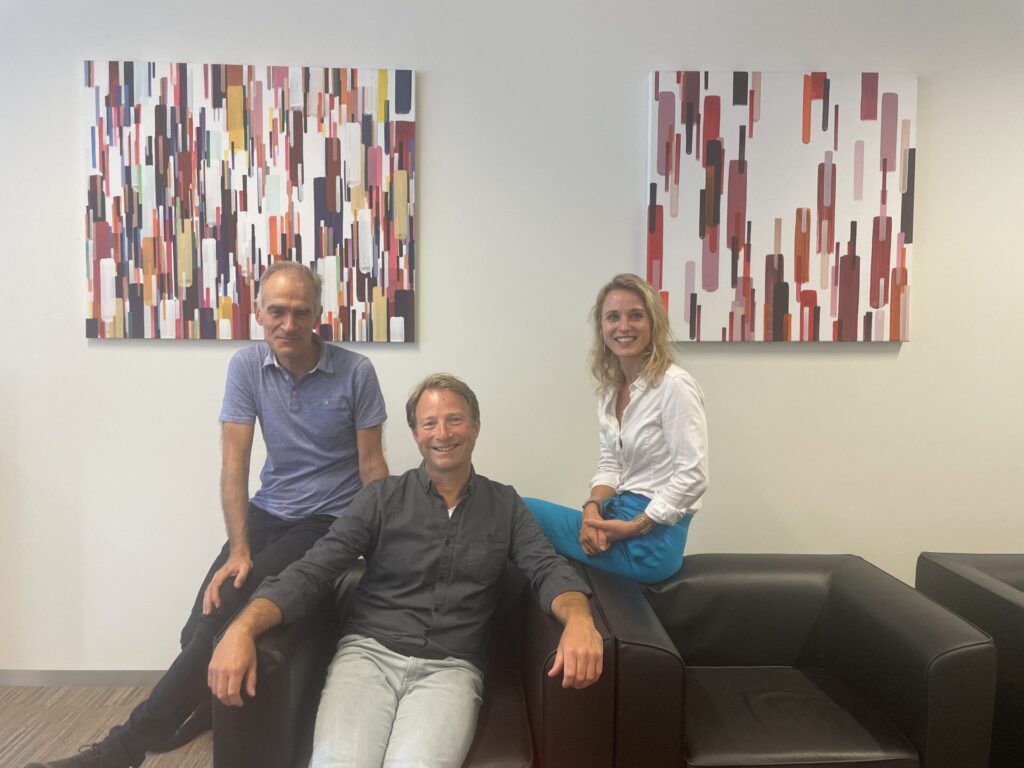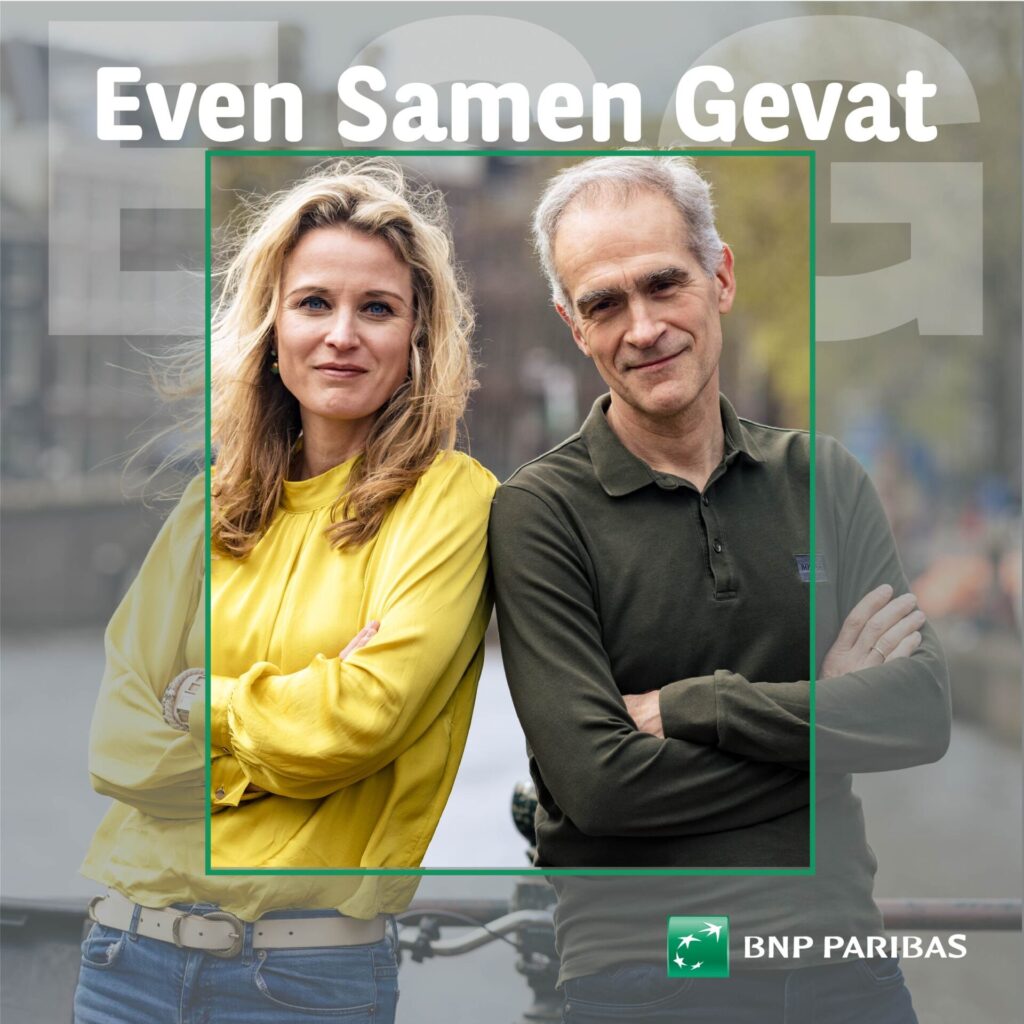Meaningful, sustainable and respectable marketing
In episode 29 of ESG (Even Samen Gevat), Marloes and Aldert speak with Tijs Timmerman, Lecturer in Marketing & Customer Experience at HU University of Applied Sciences Utrecht. The topic of discussion is the role of marketing in the transition to green.
Tijs Timmerman feels at home at his university of applied sciences. He conducts academic research and feeds back his results to businesses and to the training programme for the professionals of the future. That’s certainly important because the marketing profession is in a state of flux.
Previously, Tijs worked as a marketer for the likes of Heineken, Philips and Unilever. But it was when he was one of the final two candidates for the position of Chief Marketing Officer at Plan (previously Foster Parents Plan) that it ‘dawned’ on him. He didn’t get the job, but the process did get him thinking. ‘I noticed that I’m not really into sales goals’, he says. He ended up taking a course at THNK School of Creative Leadership in Amsterdam. ‘That programme tries to help people start social ventures: companies with a social mission. ‘I don’t think I have enough real drive or passion to make a difference with my own product or service. I prefer working behind the scenes to set things in motion.’ That’s something he can also do in his current position at HU University of Applied Sciences Utrecht. ‘I can conduct research on business cases here, which I can share with students to boot.’ Tijs sees five sustainability models for marketing. But before we get into that, let’s answer the question: ‘What exactly is marketing?’
What is marketing?
‘The essence of marketing is to create value’, says Tijs. ‘Marketers are the link between an organisation and the outside world, to consumers or to stakeholders in society in a broad sense.’ So in a company, you as a marketer would go in search of a need to turn into a brand, product or service. That’s a rather one-sided view of marketing. ‘That’s being broadened these days, says Tijs. ‘So now if we’re talking about value creation, it’s multiple value creation. You need to make sure that what you make and do and how you do that represents value to multiple parties. So what you develop, produce or market must not come at the expense of others.’ Tijs calls Too Good To Go, a venture that wants to solve the problem of wasted food, a ‘classic example of multiple value creation’.
A new direction
Tijs and his colleagues at the university of applied sciences are hard at work on changing the role of marketing ‘into a new economic perspective where sustainability is more important’. But don’t hold your breath: in today’s economy, competition is still the name of the game. ‘If that doesn’t slowly start to shift or change, marketers will be stuck in that role. Because that’s what they’re paid to do.’ Nevertheless, Tijs believes that marketers are the right ones to drive home the urgency of sustainability. But you need to make sure you don’t get caught in a discussion with the CFO. ‘That’s a hard nut to crack, because we know that brands are about what people feel and experience. As soon as you start talking about money, you’re at a dead end. As a marketer, you’re responsible for the relevance of your organisation and for the trust that the outside world has in that organisation. If you’re no longer relevant or nobody trusts you any more, you might as well pack it in. What it’s all about: how deep down do people feel something for you?’
Five models
Tijs describes five ways to do the right thing as a company and as a marketer, running from profit-driven all the way up to purpose-driven:
- ‘Opportunistic and profit-driven’ – In addition to other products or services, you also sell 10% as ‘organic’, for example. The idea: ‘A benefit for the environment or for consumers, such as “this is good for you, or you’ll feel better than ever”.’ Tijs cites the ‘green lip balm’ sold by Kruidvat as an example. ‘Somewhere in the shop you’ll see one green item next to a whole bunch of stuff that isn’t sustainable.’
- ‘Societal tax’ – Those are companies that know they constantly engage with people through their brands in order to sell them something. ‘But they also know that they need to take a position in a discussion with society. Or that they need to hold a certain belief.’ Nike does that for example. These are companies that ‘communicate a purpose while still selling loads of products as usual in the meantime.’
- ‘Licence to operate’ – Those are companies who see sustainability as a ‘hygiene factor’: ‘That simply means doing things the right way and fine-tuning your background.’ Tijs sees Cono Cheesemakers as one such example: ‘They’ve placed a video online about how they plan to make the entire chain that they have control over more sustainable in the years to come and say: this is our starting point.’
- ‘Sustainability as differentiator’ – You have a product and ensure that you make a difference by being sustainable. A few Dutch examples of this are Fairphone, Tony’s Chocolonely and Marcel’s Green Soap. Tijs says the last one is very smart about how they do that: ‘They’ve made a very simple commercial where they say: it gets things clean, smells good and – by the way – it’s also good for the planet.’
- ‘Sustainability as end game’ – These kinds of companies see sustainability as a business opportunity while solving a problem with their products at the same time. Some examples are Too Good To Go, which was already mentioned above, and Patagonia, which makes sustainable clothes. These companies were set up this way from the beginning. If you don’t do that, ‘it’s very difficult to achieve that change.’

Three expectations
Tijs says that it’s ‘incredibly tough’ for established companies and their marketers to change. You need to start by ‘stimulating an idea, driving home the urgency, especially for the first two categories of companies. And if sustainability is on your agenda, grab it by the horns and make sure that you own that creation of value in a broader sense.
We really need to turn the tide. ‘We still think in terms of business to consumer. I believe that people are starting to think much more in terms of expectations. In other words: ‘How are you relevant and meaningful to me?’ That’s the essence between people and brands. The second basic expectation is sustainability – and by that I mean in a positive way. The third expectation is about respect for people. In other words: ‘How does a company, as an organisation, treat me? Does it do justice to me, not as a consumer but as a person?’ Only then do you get a valuable relationship between people and brands – one that’s mutual.
The last one’s going to be particularly interesting, especially in a world where AI is playing a growing role. ‘AI is now actually marketing on steroids: it can really manipulate your behaviour.’ Marketers need to come up with a solution to that, but without losing sight of the ‘soft’ side: ‘I hope they keep the human touch in there and that marketers continue to see that as their task.’
If you want to learn more about meaningful marketing, you can consult this online lecture by Tijs: Marketing for humans’ sake – Betekenisvolle mens en merk relaties in digitale contex
ESG Even Samen Gevat is a podcast series (in Dutch) in which Aldert Veldhuisen and Marloes Bergevoet talk to accelerators of the sustainable transition. They discuss topics related to the “E”, like green energy, CO2 emissions, raw materials, biodiversity, the “S” of health, diversity and inclusiveness and the “G” such as laws and regulations and international cooperation.
Also published in this series are:
- The energy transition is also geo-politics – with Rob de Wijk
- 100 conversations about sustainability – with Marnix Kluiters
- There is life after growth – with Paul Schenderling
Follow Even Samen Gevat here so you don’t miss an episode!
